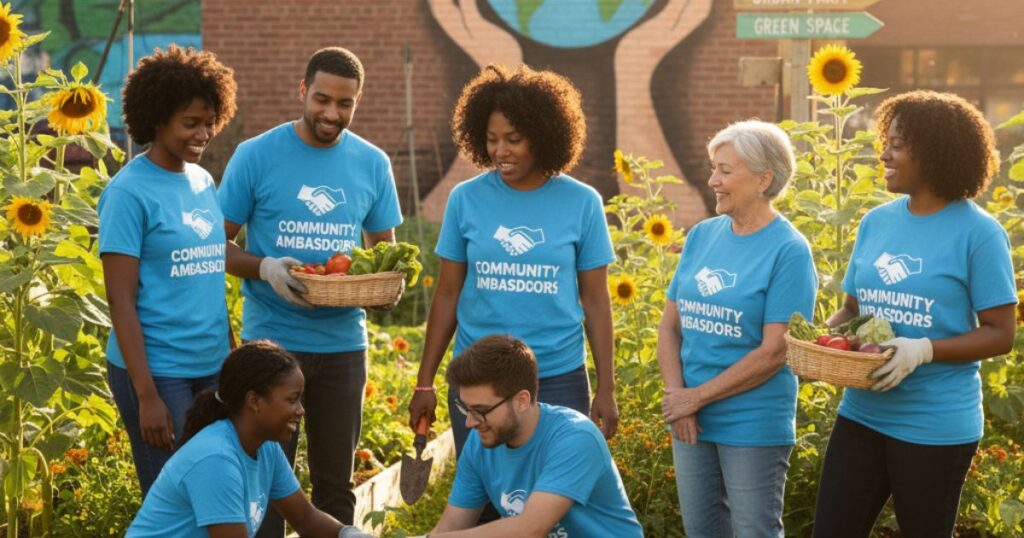In every thriving neighborhood, there are people who go the extra mile to connect, support, and inspire others. These are Community Ambassadors — trusted local leaders who bridge the gap between organizations, residents, and decision-makers.
They play a vital role in community engagement, social cohesion, and grassroots development, helping residents voice their needs, share resources, and take part in meaningful local action. Whether it’s promoting a health campaign, organizing a neighborhood cleanup, or facilitating participatory budgeting, community ambassadors help turn ideas into impact.
What Is a Community Ambassador?
A Community Ambassador is a resident or volunteer trained to represent their neighborhood or organization. They serve as connectors — building trust, spreading awareness, and encouraging collaboration between the community and public or private institutions.
They often work with nonprofits, city councils, schools, and local businesses to strengthen civic participation and build resilient communities.
Key roles of a Community Ambassador include:
-
Listening to community concerns and bringing them to local leaders.
-
Supporting public outreach for city or nonprofit programs.
-
Organizing local events and educational workshops.
-
Encouraging participation in civic engagement and community-building activities.
-
Sharing local success stories to inspire collective action.
Why Community Ambassadors Are Essential for Stronger Neighborhoods
1. Building Trust and Inclusion
In diverse cities, not everyone feels equally represented. Community Ambassadors help bridge cultural, linguistic, and generational divides, ensuring all voices are heard. This fosters inclusive communication and mutual understanding.
2. Strengthening Local Networks
Ambassadors help connect residents with local services, from public health programs to job training opportunities. By building networks, they strengthen social capital, which is the foundation of resilient communities.
3. Driving Civic Engagement
By organizing town hall meetings, youth programs, and environmental initiatives, ambassadors encourage residents to take ownership of their shared spaces and contribute to local development.
4. Enhancing Public-Private Collaboration
Community Ambassadors often act as liaisons between municipal governments, nonprofits, and citizen groups. Their insights help shape more effective policies and programs that reflect real community needs.
Becoming a Community Ambassador: Steps to Get Started
If you’re passionate about making a difference where you live, becoming a Community Ambassador is a powerful way to start.
Here’s how you can begin:
-
Get Involved Locally – Attend community meetings, volunteer, and connect with civic organizations.
-
Build Relationships – Engage with residents, local leaders, and advocacy groups.
-
Develop Communication Skills – Learn how to facilitate discussions and mediate between different perspectives.
-
Partner with Institutions – Collaborate with local government or nonprofits that offer ambassador programs.
-
Stay Informed – Keep up with neighborhood issues, development projects, and city initiatives.
Impact Stories: How Community Ambassadors Make a Difference
Across the world, Community Ambassador Programs have shown how small efforts can lead to big change.
-
In New York City, ambassadors helped boost vaccination rates in underserved neighborhoods.
-
In London, ambassadors organized workshops to combat digital exclusion among seniors.
-
In Dhaka, community ambassadors worked on waste management awareness, reducing litter and improving sanitation.
Each story proves that when people connect, change becomes sustainable.
Conclusion: The Power of Local Leadership
Community Ambassadors are the heartbeat of neighborhood transformation. They bring empathy, leadership, and connection to the forefront of civic life. By empowering residents, strengthening partnerships, and championing local initiatives, ambassadors create the foundation for thriving, inclusive, and resilient communities.
If you believe in collaboration and care deeply about where you live — becoming a Community Ambassador might be your next meaningful step.
FAQs
1. What skills do Community Ambassadors need?
Strong communication, leadership, problem-solving, and relationship-building skills are essential. They also need cultural sensitivity and a passion for community service.
2. Are Community Ambassadors paid or volunteer roles?
It depends on the program. Some are volunteer-based, while others, especially city-led initiatives, offer stipends or part-time employment.
3. How do Community Ambassadors benefit organizations?
They improve outreach, build trust with local residents, and provide valuable feedback that helps organizations design better programs.
4. Can anyone become a Community Ambassador?
Yes. Anyone passionate about making a difference and committed to collaboration can apply or volunteer, often through local councils, nonprofits, or community foundations.
5. What’s the difference between a Community Ambassador and a Community Leader?
A Community Leader may hold a formal leadership position, while a Community Ambassador focuses on building bridges, communication, and engagement within and between groups.



